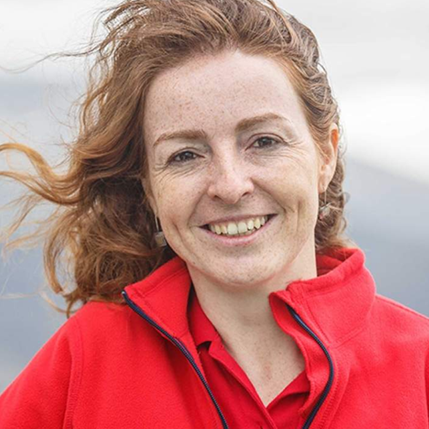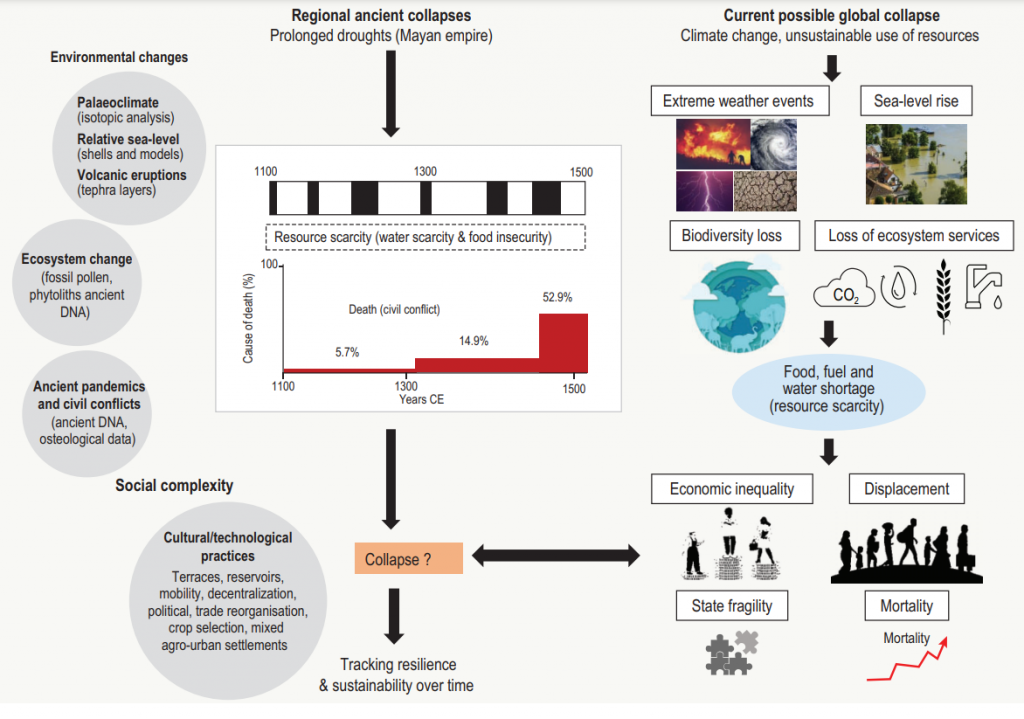Climate change could bring about the collapse of our civilization (as has already happened in other cases)
In a perspective article published in National Science Review, Josep Peñuelas and Sandra Nogué make a case for acknowledging the possibility of climate change causing the collapse of ecosystems and societies. The authors say the target of limiting global warming to under 2°C, as established in the Paris Agreement, has resulted in studies of climate change taking overly conservative approaches so as to avoid alarmism and more complex and, thus, more difficult risk assessments. Nonetheless, the ever-increasing intensity of climate change and the existence of feedback processes that exacerbate it, together with consequent food insecurity, civil unrest and migrations, are leading scientists to consider a potential catastrophic denouement, like the fate that befell certain civilizations in the past..
Scientists are beginning to consider a potential catastrophic denouement, like the fate that befell certain civilizations in the past.
Peñuelas and Nogué state that the scientific community is shifting its focus towards more complex assessments of climate change. That entails studies that take into account the devastating nature of the domino or cascading effects of different chains of events: fires, droughts, floods and heatwaves on the one hand, and conflicts, migrations and growing inequality on the other.

“There is an urgent need to include feedback loops in climate modelling and consider possible tipping points that could cause greater concentrations of greenhouse gases.”
JOSEP PEÑUELAS, profesor de investigación del CSIC en el CREAF.
According to the article, current models tend to overlook that, at some point, there could be a drastic reduction in nature’s carbon capture capacity (if the health of nature worsens), or a major increase in fires, droughts or permafrost thaw, processes that could all release huge quantities of methane and CO2. At certain temperature thresholds, such feedback loops might trigger sudden, irreversible changes.
“The interaction of climate change with other anthropogenic stressors, such as changes in land use, biodiversity loss, pollution, and resource depletion, could result in the planet facing a catastrophic mix of crises,” concludes Peñuelas.
Studying the past to see what lies ahead
The article places emphasis on studying climate change-induced collapses and transformations human societies have undergone in the past. Such events provide highly valuable information on adverse situations we may come to experience, as well as on possible solutions.

“For example, the cases of the Central American Mayan civilization, the Roman Empire, Greenland-Iceland Norse culture and the society of Easter Island show that collapses rarely have a sole cause; they rather tend to be influenced by a combination of biological and socioeconomic stress factors, including climate change, resource scarcity and conflicts.”
SANDRA NOGUÉ, investigadora de la UAB en el CREAF con un prestigioso proyecto del European Research Council.
Palaeoecological and archaeological research has revealed that, in the past, in Angkor Wat (Cambodia) and Sri Lanka, reservoirs were established to support agriculture and terraces were built to lessen the risk of flooding. Elsewhere, bioarchaeological data from Mayapan (Yucatán, Mexico) indicate that the diet of the Maya included drought-resistant indigenous plants. This shows that they had cultural practices and knowledge that enabled them to adapt to difficult climate conditions and ensure their survival.

Beyond the human limit
The worst-case scenarios set out in the 2022 IPCC report envisage temperatures not reached in the last 50 million years.
Human societies have specific climate niches, and the scale of current and future warming will probably overwhelm our adaptive capacity. The worst-case scenarios set out in the 2022 Intergovernmental Panel on Climate Change (IPCC) report envisage temperatures not reached in the last 50 million years. If those scenarios materialize, millions of years of cooler climates will have been reversed in just two centuries. It has been predicted that climate conditions will begin to resemble those of the Pliocene Epoch (warmer and drier) as of 2030.Unless we succeed in cutting greenhouse gas emissions, we are likely to experience climates similar to those of the Eocene Epoch (up to 10 degrees hotter than at present) in the coming decades.
The article’s authors underline the need for interdisciplinary research that analyses examples from prehistoric and historical times and takes technological progress and changes in social complexity and cognitive levels into account. Such research could help policymakers and society in general better understand the urgency of tackling climate change, and prompt improvements in resilience and proactive measures to protect ecosystems and societies in the interests of a sustainable future.







